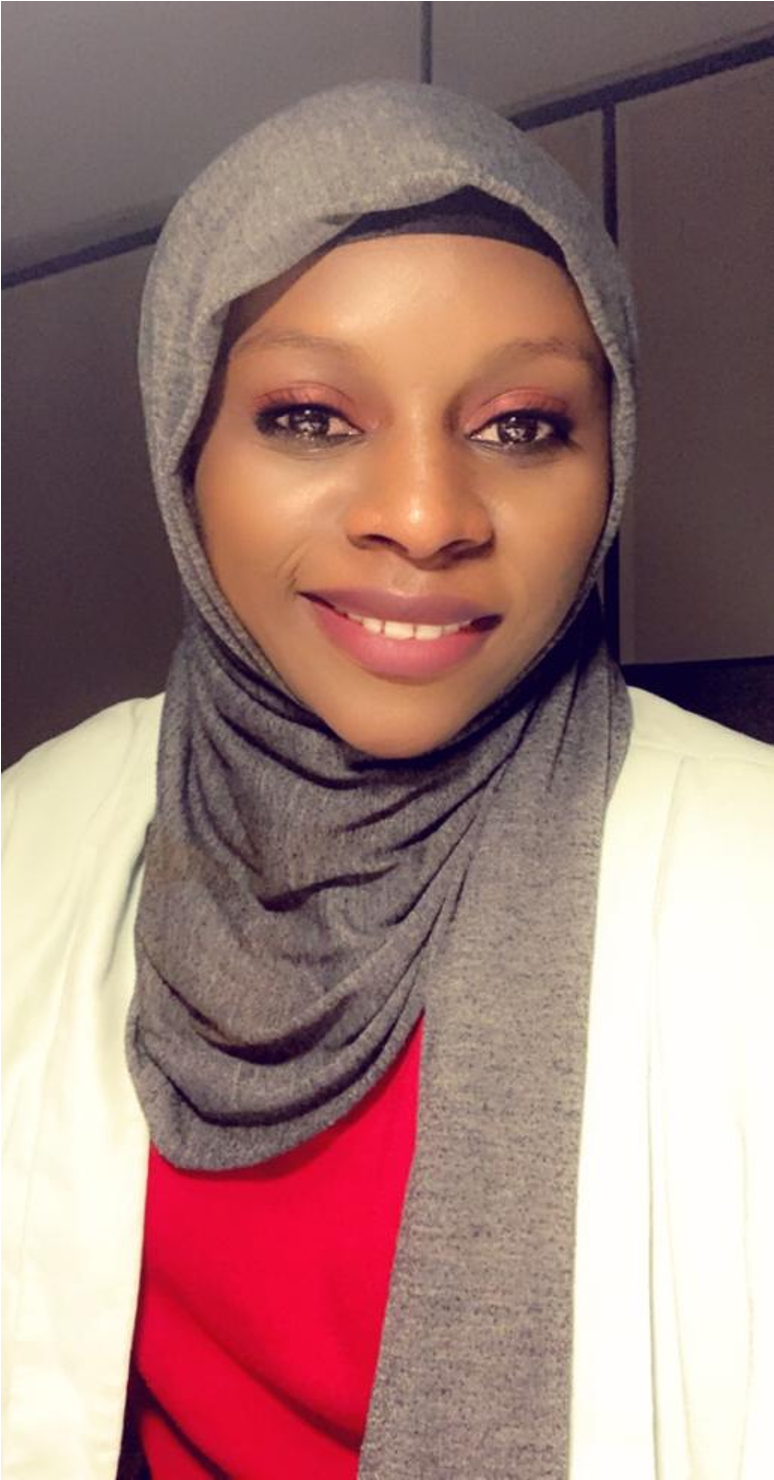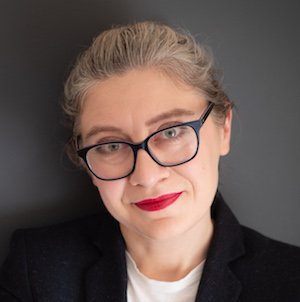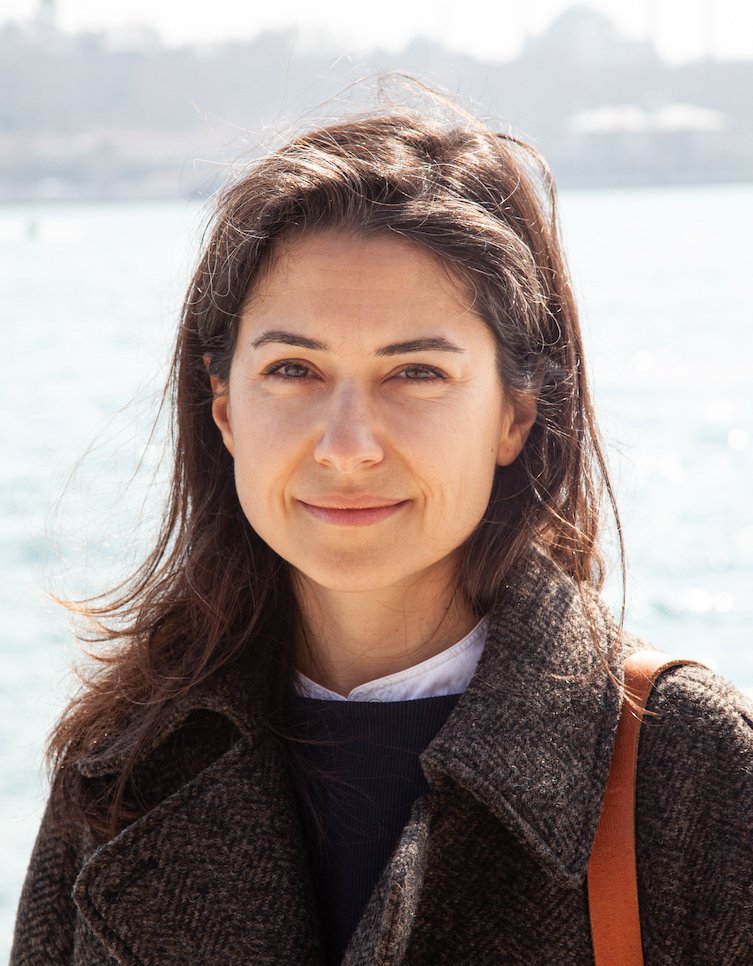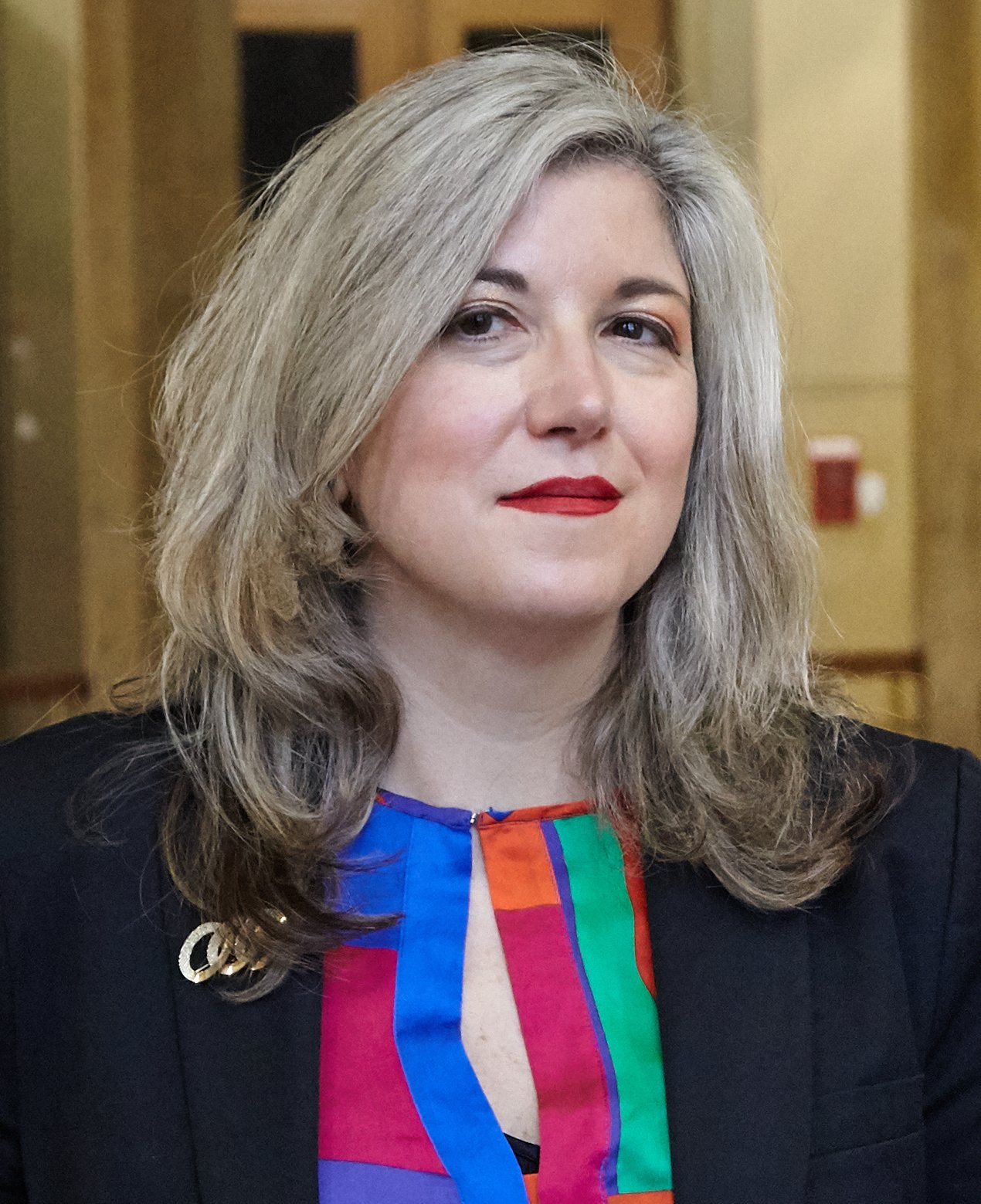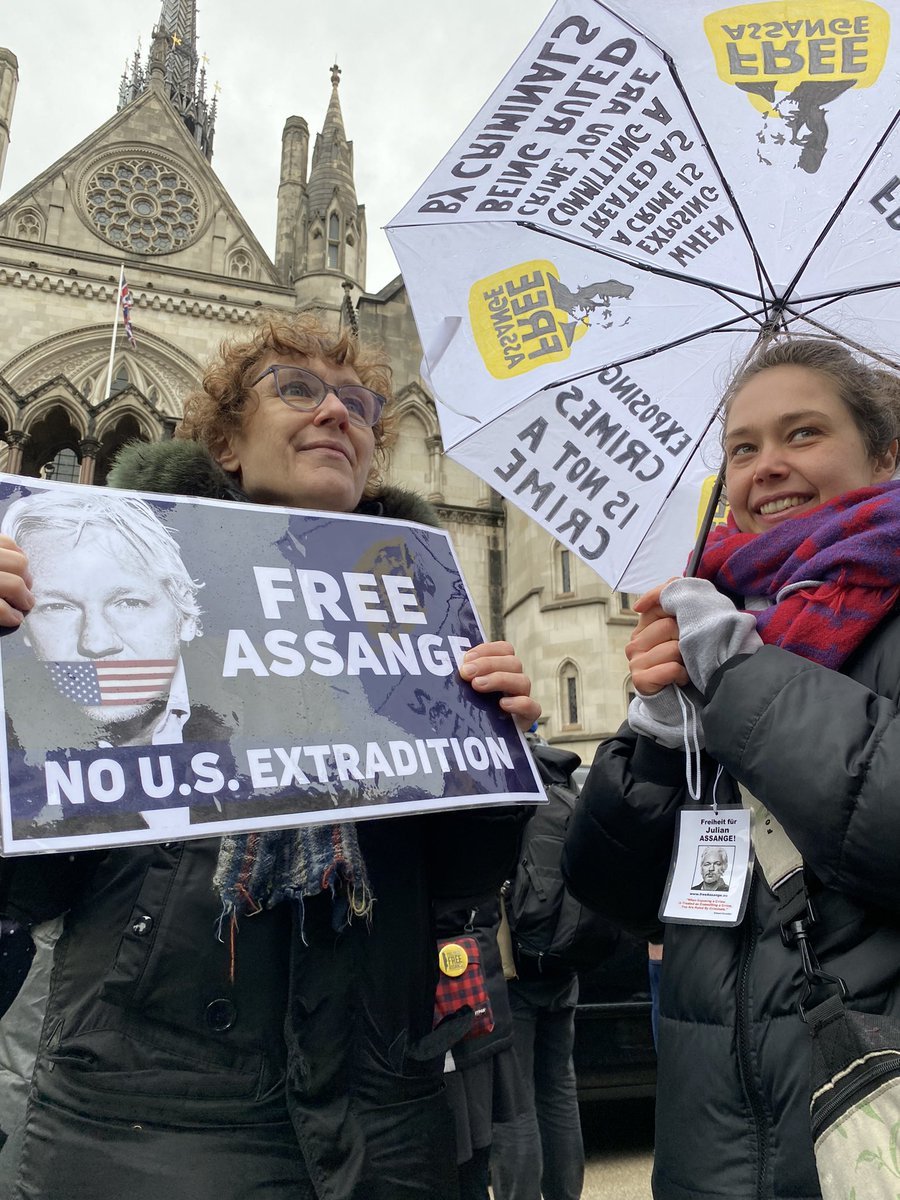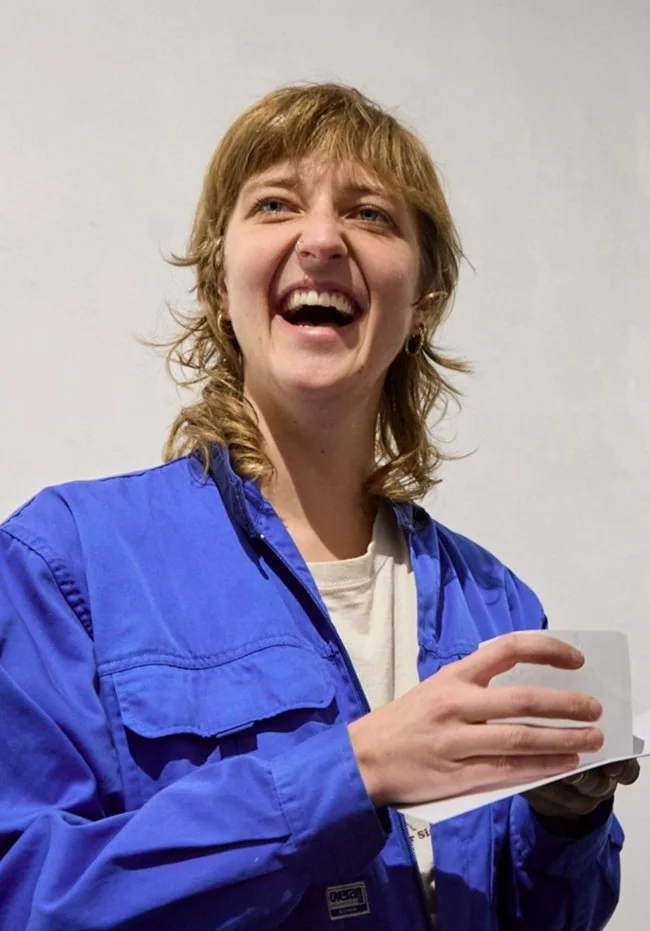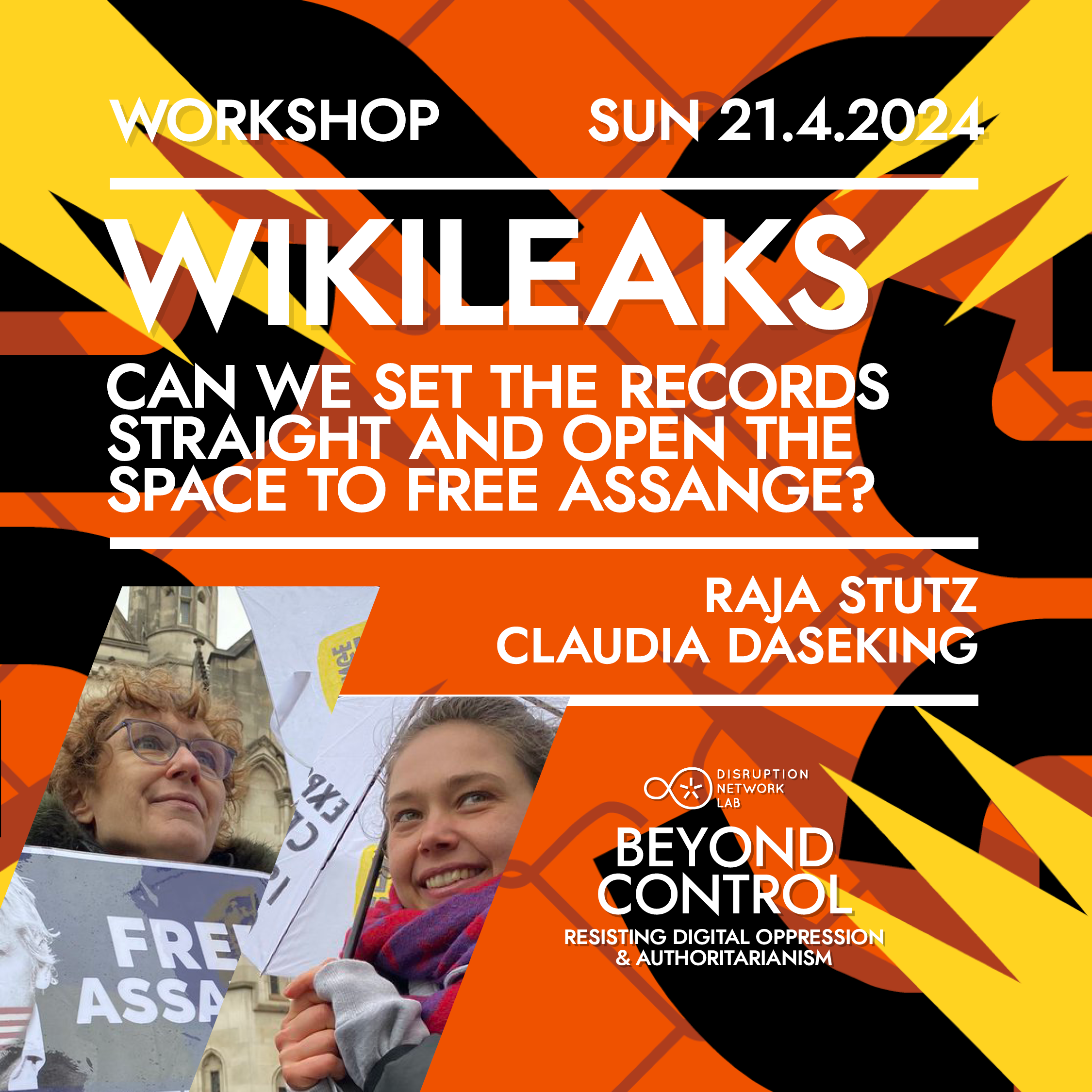#DNL32 · April 20–21 · 2024
BEYOND CONTROL
Resisting Digital Oppression & Authoritarianism
THE 32nd CONFERENCE OF THE DISRUPTION NETWORK LAB
studio 1, KUNSTQUARTIER BETHANIEN, marianneplatz 2, 10997 Berlin & STREAMING
Curated by Tatiana Bazzichelli (Director, Disruption Network Lab, IT/DE) in collaboration with Global Voices.
Streamed for free. No registration required to follow the stream.
Workshops are not streamed
Live Stream · Schedule · Introduction · Full Programme · Workshops · Speakers · Press · Tickets
Livestream April 20, 2024
No tickets required to watch the stream
Unveiling the Depths of Online Racism: Jihad Van Puymbroeck's Story to Justice
Gaza, Ukraine & Azerbaijan: Challenging Network Authoritarianism #DNL32 #BeyondControl
Challenging wartime systems of misinformation, communication monopolies & anti-democratic propaganda machines.
The 32th conference of the Disruption Network Lab. Curated by Tatiana Bazzichelli in collaboration with Global Voices
LOCATION: STUDIO 1, KUNSTQUARTIER BETHANIEN, MARIANNENPLATZ 2, 10997 BERLIN
STREAMED FOR FREE
Back to top
Schedule
Saturday April 20, 2024 · Get Tickets
16:00 CET · Doors open
16:30 – 16:40 · OPENING
Tatiana Bazzichelli (Artistic Director, Disruption Network Lab, IT/DE)
16:40–18:10 CET · KEYNOTE · Unveiling the Depths of Online Racism: Jihad Van Puymbroeck's Story to Justice
Jihad Van Puymbroeck (Activist & Communication Strategist, BE). Moderated by Nyima Jadama (Activist & Moderator, GM/DE).
18:40 –20:40 CET · PANEL · Gaza, Ukraine & Azerbaijan: Challenging Network Authoritarianism
Manolo Luppichini (Filmmaker & Author, IT), Arzu Geybulla (Journalist & Editor, AzNet Watch, Global Voices, AZ/TR), Tetyana Lokot (Associate Professor in Digital Media and Society, Dublin City University, UA/IE).. Moderated by Tatiana Bazzichelli (Artistic Director, Disruption Network Lab, IT/DE).
Sunday April 21, 2024 · Get Tickets
11:00–13:00 CET · WORKSHOP #1 · Community Girlblogging to Save The Internet
Irma Mastenbroek (Mathematician & AI Researcher, NL/DE)
14:30–16:30 CET · WORKSHOP #2 · WikiLeaks: Can We Set the Records Straight and Open the Space to Free Assange?
Raja Stutz & Claudia Daseking (Assange Support Berlin, DE)
BEYOND CONTROL:
Resisting Digital Oppression & Authoritarianism
Curated by Tatiana Bazzichelli (Director, Disruption Network Lab, IT/DE) in Collaboration with Global Voices.
Funded by: Hauptstadtkulturfonds (The Capital Cultural Fund), The Reva and David Logan Foundation. Part of New Perspectives for Action. A project by Re-Imagine Europe, co-funded by the European Union.
In Collaboration with: Global Voices
In cooperation with: Wau HollanD Stiftung.
Partner Venues: Kunstraum Kreuzberg /Bethanien, nGbK.
Media Partners: taz, Hostwriter, Il Mitte.
Streaming partner: Boiling Head Media.
Technology Partner: Geier-Tronic.
Challenging wartime systems of misinformation, communication monopolies & anti-democratic propaganda machines.
With the conference BEYOND CONTROL, we seek to understand what motivates, shapes and influences digital authoritarianism and online systematic oppression around the world, no matter the style of government or political configuration. Our approach is to show how we can counter digital repression through grassroots empowerment, and how we can use distributed information to make people aware of injustices and abuses of power.
We frame an understanding of what is popularly known as digital authoritarianism, and meet the people exploring how to challenge its hypothetical futures, through media investigations, activism, art and resistance. We seek to understand, uncover, and counter the use of information technologies in authoritarian contexts as well as in the context of strategic targeting of dissidents, journalists, migrants, and minorities. We investigate how digital platforms are increasingly being used to oppress people in non-democratic contexts, but also in Western democracies. Understanding the growth of authoritarian and discriminatory uses of technology is the key for discussing a framework for ethical and just use of information..
On the one hand, the event challenges systematic strategies of repression to advance political goals, discussing misinformation and information warfare in the context of right-wing propaganda. On the other hand, it exposes the monopoly of communication channels that can shape and distort reality, conceal abuses and maintain power, and presents strategies to circumvent restricted access to technology and information during wars and conflicts.
The internet constituted a space of relative freedom for a generation, but that space has greatly narrowed as governments master increasingly effective and censorship protocols, shaping not just messaging and news, but conversation spaces and the conduct of social media platforms. Ironically, this emergent control is often built with the complicity of technology companies, both from authoritarian and democratic states. While open, anonymous and free spaces still exist online, they are increasingly hard to protect, and often require significant technical skill to access. Furthermore, the idea of “freedom of expression” has been co-opted by right-wing and extremist rhetoric, utilizing digital tools and online platform to spread hate, inciting violence, racism, and negationism.
The internet is dominated by advertising technology that tracks and segments users for commercial gain. Governments, states, and political groups and parties, often in collaboration with corporations, harness this surveillance power, and this practice is only growing as technology leaps forward with machine learning, facial recognition, and the use of artificial intelligence for “predictive” analysis.
This conference and workshops aim to expose information architectures of control and misinformation, and how strategies of surveillance and censorship are used to silence and systematically target specific individuals or entire populations. But it also wants to show how to resist such systems of oppression by demonstrating how digital culture and technology can be used to empower people, going beyond digital control into real life to make concrete change.
Special thanks to the Global Voices team, especially Ivan Sigal, Filip Noubel and Ameya Nagarajan, for their contribution in developing the concept for this conference.
Back to top
Full Programme
Saturday April 20, 2024 · Get Tickets
16:00 · Doors open
16:00 – 16:40 · OPENING & INTRODUCTION · Get Tickets
Tatiana Bazzichelli (Artistic Director, Disruption Network Lab, IT/DE)
16:40 – 18:10 · KEYNOTE · Get Tickets
Unveiling the Depths of Online Racism: Jihad Van Puymbroeck's Story to Justice
Jihad Van Puymbroeck (Activist and Communication Strategist, BE). Moderated by Nyima Jadama (Activist & Moderator, GM/DE).
In January 2018 Jihad Van Puymbroeck started to work at VRT NWS, the Flemish Public Broadcast. It was a moment she should have celebrated, where she could be proud of herself. But it was taken away from her, and even more than that. Who is Jihad Van Puymbroeck? A woman, a Muslim woman, with Moroccan and Belgian origins, committed and ambitious. Apparently the ideal target for the Flemish far right youth movement Schild & Vrienden. The head of the organization Dries Van Langenhove orchestrated an online racist hate campaign against her. Her overall presence in influential environments was disturbing their vision of the Belgian landscape. Their strategy to clear Jihad from the way was by making her loose her job at the strategic employer, attempting to gagging and damaging her professional and mentally.
In September 2018 journalists of VRT NWS found a way to infiltrate the online Discord groups of Schild & Vrienden and their secret activities. To the outside eye, the members succeed to build a misleading image through their well-dressed looks and eloquence. Take a deeper look and you discover a closed network where racism and sexism are rife. They uncovered the racist, sexist and antisemitic face of the right-wing group. A criminal investigation was launched after the VRT documentary.
Jihad Van Puymbroeck is one of the civil parties, she discovered a file of 200 pages of ‘secret conversations’ with the aim of smearing her. After more than 6 years the judge sentenced Dries Van Langenhove with 1-year prison sentence. Jihad Van Puymbroeck won her case after a long agony. The judge specifically mentioned Jihad in his judgement: “He encourages antagonism, discord and conflict and as such fosters physical and psychological violence."
Jihad Van Puymbroeck will tell her story about the reasons which drove her becoming a civil party, what strategy she used to sustain this legal battle, how she almost gave up but eventually saw how justice prevails.
18:40 – 20:40 · PANEL · Get Tickets
Gaza, Ukraine & Azerbaijan: Challenging Network Authoritarianism
Manolo Luppichini (Filmmaker and Author, IT), Arzu Geybulla (Journalist and Editor, AzNet Watch, Global Voices, AZ/TR), Tetyana Lokot (Associate Professor in Digital Media and Society, Dublin City University, UA/IE). Moderated by Tatiana Bazzichelli (Artistic Director, Disruption Network Lab, IT/DE).
This panel brings together three different stories from Gaza, Ukraine and Azerbaijan, documenting the monopoly of communication channels during wartime and how strategies of digital authoritarianism can be used to maintain power, target people and distort reality. We will also discuss how it is possible to circumvent restricted access to digital infrastructure in war, and how it is possible to empower people to use distributed tools to fight digital oppression.
Besides killing tens of thousands, the Israeli offensive has been destroying Gaza's telecommunications infrastructure. To bypass the blackouts and restore connections in hard-hit areas, NGO ACS-Italia is testing a network of Web-Trees: mobile hotspots radiating free, universally-accessible WI-FI signal. Web-Trees are grown by local Web-Gardners, committed to keep their community connected to the rest of the world and to their social ties. Manolo Luppichini will bring his recent direct experience in Rafah, when together with NGO ACS-Italia, he worked on developing the Gaza’s Web-Trees project to provide digital access within Gaza. ACS-Italia has been active in Gaza for decades with humanitarian projects aimed at young people, providing traditional emergency aid and witnessing every day the communication embargo imposed by Israeli authorities over Gaza. The eSim FREE hotspots, or "Web Trees”, are the fastest emergency response in which ACS is investing resources and beginning to see encouraging results. Some of the latest mobile phones can connect to international mobile networks via eSim, a digital version of the physical SIM card. A stable connection to Egyptian and Israeli networks can be activated inside the strip by sending eSims access codes to people in possession of compatible devices in Gaza. Working with cooperating staff in Gaza, ACS is setting up a series of hotspots. With minimal organizational overhead - and no special permissions required - a series of Web-Trees can be established in refugee camps and other areas where telephone service is inaccessible or under the strict control of Israeli authorities (more info in Italian).
Journalist and editor Arzu Geybulla will speak about Azerbaijan's passionate affair with digital authoritarianism. Since 2003, the government has deployed an array of measures and tactics to spy on civil society representatives and the public at large and resort to digital censorship, persecution, and repression. As a result, Azerbaijan has ranked poorly year-on-year, on many international indexes measuring political and social freedoms including its backsliding on internet freedoms. We have seen and documented more sophisticated, more intrusive, and more diverse technology deployed in the country with the sole purpose of restricting access to independent information, spreading state-sponsored propaganda, intimidating users online and so on. The government has also taken its repressive measures beyond borders, while deploying digital transnational repression to silence dissident voices. It has also successfully deployed information controls during the Second Karabakh war, which Armenia and Azerbaijan fought in 2020. That year, Azerbaijani citizens were cut off from the Internet. The state justified the disruptions as part of information security measures. For 44 days, access to basic online services, communication applications and platforms, as well as to much of the internet was throttled. The use of VPN services was discouraged and in some cases users who did rely on VPN services were accused of being pro-Armenian or that VPN providers were Armenian companies and so on. In September 2023, it became evident that Azerbaijan which was on the list of clients to purchase Pegasus, was also using it to target Armenian civil society. In October 2023, the Parliamentary Assembly of the Council of Europe, "urged five governments to provide information on their use of such spyware within three months, and fully investigate all cases of abuse." Azerbaijan was one of the five member states. The state is yet to respond to this decision. And whether they do remains to be seen.
Tetyana Lokot presents how to resist networked authoritarianism in Ukraine’s occupied territories during Russia's full-scale invasion. Russia’s full-scale invasion of Ukraine in February 2022 has seen the authoritarian state mixing its usual external cyber warfare tactics with internet control and information manipulation approaches inspired by its internal networked authoritarian regime. Russia’s interventions in the information spaces and telecommunications infrastructure in temporarily occupied Ukrainian territories demand greater scrutiny, yet we should also be studying Ukrainians' grassroots citizen responses to these threats. This analysis of the ‘networked authoritarian’ creep of Russia’s censorship and surveillance tactics beyond its borders as a part of its expanding war arsenal highlights the challenges of both destructive targeting of communications infrastructure and informational attacks on the digitally connected citizens and communities in Ukraine. Focusing on the interplay of offline and online actions of ordinary citizens and grassroots activist groups, Tetyana Lokot discusses Ukrainians’ capability for resistance and resilience in the face of Russia’s networked authoritarianism in the context of the war. What are the implications of Russia's authoritarian tactics and Ukrainians' resistance strategies for the post-war reimagining of Ukraine's civil society and internet governance and for the broader international digital rights and peacebuilding community?
11:00-13:00 WORKSHOP 1 · Get Tickets
Community Girlblogging to Save The Internet
With Irma Mastenbroek (Mathematician and AI Researcher, NL/DE).
Who runs the world? Girls*! Girls are our greatest cultural and aesthetic trendsetters, highly influential in spreading new trends, slang and cultural norms - which are then adopted by the wider culture. So in this age of digital cultural crisis, who better to steer the internet away from its neoliberal, commercialised path to self-destruction than girls? In this workshop we will explore how the collaborative coding of HTML+CSS web pages can help us gain independence from Big Tech and rebuild community, from URL to IRL.
*Girls: in our usage, girl refers to those who align with the spirit of radical empowerment and inclusivity. It's the girl from "Yaas girl" and "You go girl!", gender unbound.
In digital/hacker circles, it is now common to romanticise what the internet used to be like, before Big Boi Tech took us all hostage on their capitalist, attention-grabbing platforms. Back in the good old days of the early web, information and web-building skills were freely shared, individual sites showcased a wide variety of aesthetics and provided an exciting place to explore and find other's silly creations. But nostalgia is not enough. By going back to source code (using only HTML & CSS - the building blocks of the web), we can reinvent the lost practice of OG "girl blogging" as popular in the Tumblr age. Girls can bring back our culture of making cute websites just for funzies.
Community girlblogging is the desire to exist on- and offline, on our terms, without capitalist incentives, spy software and mean comments. Instead we want community, chaos and lots of glitter. <3
Requirements:
No coding skills required. It is also possible to design our personal webpages on paper!
What to bring:
All optional, something to reflect your vibe:
1) laptop, tablet
2) Crafty materials
3) Old magazines and prints
4) Fuzzy fabrics and cute things like glitter
We will come prepared with crafty materials, so it's not super necessary that people bring it. But it's fun to have more personal things to make the webpages more uniquely you!! There are surely some crafty queens out there.
14:30-16:30 WORKSHOP 2 · Get Tickets
WikiLeaks - Can We Set the Records Straight and Open the Space to Free Assange?
Raja Stutz & Claudia Daseking (Assange Support Berlin, DE)
Strategies for reclaiming public opinion about WikiLeaks' contribution to press freedom and our right to know.
The Australian journalist Caitlin Johnston warned as early as 2021 not to waste the energy refuting all the lies circulating about WikiLeaks & Julian Assange. Instead, she proposed to confront people with the simple question: Should journalists go to jail for exposing war crimes? That sounds constructive and efficient. But it's also hard to bear watching some of the current mainstream TV content where supposed experts unabashedly side with the US prosecutors' version of things, while friendly but very moderately informed supporters of Assange's freedom stand no chance against them.
As seen on the recent talk show "Lanz" or the ZDF podcast Lanz-Precht, to name a few, to refute lies you need to know a lot more than the spreaders of false facts.
In this workshop, two activists from Assange Support Berlin want to share their knowledge and doubts, their experience of spreading word via social media as well as reaching out to mainstream journalism, in order to develop options for action together with the participants. The workshop unites playful and serious thinking.
What to bring:
Don't forget your internet devices for small team assignments and a brain-squeezing quiz.
Back to top
Press
Press Release (EN) · Pressemitteilung (DE)
Press Kit - Texts, Photos, Bios, Graphics & more
Contact press@disruptionlab.org for accreditation & interviews
Back to top
Speakers
Jihad Van Puymbroeck
Activist & Communication Strategist, BE
Jihad Van Puymbroeck is a communication strategist specialised in impact and inclusion with a heart for social profit and media. She has been active in the anti-racist civil society for more than 10 years. She started her career in the social profit sector as a communication and press officer and extended her experience further within the Flemish Public Broadcast, VRT NWS, as a social media expert. As a freelance public speaker, trainer and consultant she is specialised in the topics racism, inclusion, online communication and media. The past three years she was chairwoman of Hand in Hand tegen Racisme, a movement that fights against structural racism and is specialised in decolonisation. Jihad Van Puymbroeck is one of the civil parties in the lawsuit against Schild & Vrienden, a Flemish far right youth movement who attacked her online. She won her case after a long agony.
Nyima Jadama
Activist & Moderator, GM/DE
Nyima Jadama, is an award-winning TV host and media trainer from The Gambia, passionately dedicates her work to empower marginalised communities. She hosts 'Nyima's Bantaba' and 'Unfiltered Podcast', connecting migrants, refugees, women and diaspora groups worldwide on critical issues such as migration, integration, women's empowerment and cultural diversity. Nyima also founded the 'Bantaba Academy' for migrants and refugees and has received several notable awards for her activism and media advocacy, including the 2023 'Silvior Maier Pries' from the Friedrichshain-Kreuzberg district of Berlin. She was the first refugee advisor to the German government at the High Level Official Meeting in Geneva in 2021. She goes beyond advocating for refugees and migrants at the international level as a co-team member and focal person for Germany in the European Coalition of Migrants and Refugees (EUCAMAR). Nyima currently works part-time as a project assistant for Media in Cooperation and Transition (MiCT) Berlin.
Manolo Luppichini
Filmmaker & Author, IT
Over the past 25 years Manolo co-founded a number of pioneering media projects combining new technologies, social issues and art (The Church of Electrosophy, Candida TV, DeriveApprodi, Indymedia among others). His latest work explores the combination of VR and narrative documentary. He has been a film director since 1994, working on documentaries, music videos and advertising campaigns. He worked as an assistant to Vittorio Storaro, the Italian cinematographer who won Oscars for "Apocalypse Now", "Reds" and "The Last Emperor”, and as assistant director, director of photography and film director for hundreds of productions, filming in Europe, the US, Africa, Middle East and South Asia. His works have been aired on RAI, Mediaset, Fox Life, SKY, Al Jazeera, Schweizer Fernsehen (SRF), and prime time Rai 3 TV show “Presa Diretta”.
Arzu Geybulla
Journalist & Editor, AzNet Watch, Global Voices, AZ/TR
Arzu Geybulla is an Azerbaijani journalist with a special focus on digital authoritarianism and its implications on human rights and press freedom in Azerbaijan. She has been covering developments in Azerbaijan for various international media outlets since 2009, including Al Jazeera, Eurasianet, Open Democracy and Radio Liberty, with a byline on CNN International. Arzu is also regional editor for South Caucasus and Turkey at Global Voices. In 2019, Arzu launched Azerbaijan Internet Watch, a platform that documents, and monitors digital information controls and its impact on civil society in Azerbaijan. She continues her collaboration and affiliation with various international organizations and initiatives focusing on Azerbaijan and beyond, on issues such as transnational digital repression, safety of women journalists online, and platform accountability to name a few.
Tetyana Lokot
Associate Professor in Digital Media and Society, Dublin City University, UA/IE
Dr Tetyana Lokot is Associate Professor in Digital Media and Society at the School of Communications, Dublin City University, Ireland. She researches protest and mobilisation, threats to digital rights, networked authoritarianism, internet freedom, and internet governance in Eastern Europe. Her work has been published in multiple scholarly journals and she frequently contributes commentary to leading global media, including Coda Story, Wired, Bloomberg and The Washington Post. She is the author of Beyond the Protest Square: Digital Media and Augmented Dissent (2021).
Tatiana Bazzichelli
Artistic Director & Founder, Disruption Network Lab, IT/DE
Tatiana Bazzichelli is the founder and director of the Disruption Network Lab. Her work focuses on whistleblowing, network culture, art and hacktivism. She is the author of Whistleblowing for Change (2021), Networked Disruption (2013), Disrupting Business (2013) and Networking (2006). In 2011-2014 she was programme curator at the transmediale festival in Berlin. She received a Ph.D. in Information and Media Studies from the Faculty of Arts, Aarhus University, Denmark in 2011. Her dissertation, Networked Disruption: Rethinking Oppositions in Art, Hacktivism and the Business of Social Networking, was the result of her 2009 visiting scholarship at Stanford University's H-STAR Institute. She has been appointed by the German government and the city of Berlin as a jury member for the Capital Cultural Fund for 2019-2021, and as a jury member for the Kulturlichter Prize, a new award for digital cultural education in Germany, for 2020-2023.
Irma Mastenbroek
Mathematician & AI Researcher, NL/DE
Irma Mastenbroek is a Berlin-based digital rights activist and technofeminist. She has a background in mathematics with a focus on network science, AI, and data feminism. She founded LODelle, for digital feminist networks and initiated a collaborative project to regulate major online pornography and rebuild the industry with consent and more cyber intimacy. Irma is involved in researching AI bias and working on AI auditing and ethics, and is researching girl blogging and girl math for the Institute of Network Cultures in Amsterdam.
Raja Stutz & Claudia Daseking
Assange Support Berlin, DE
Claudia Daseking and Raja Stutz have been closely following the political and media development of the Assange case for years. Together with other committed people, they are working to raise public awareness of the case and its significance through street campaigns and events such as film screenings, readings and panel discussions. New projects are constantly emerging, driven by people in different constellations. What unites them all is the conviction that the Assange case affects our fundamental values and rights, that it affects us all, and that we need an informed public opinion that can counter the media's misrepresentations and call on politicians to act.




